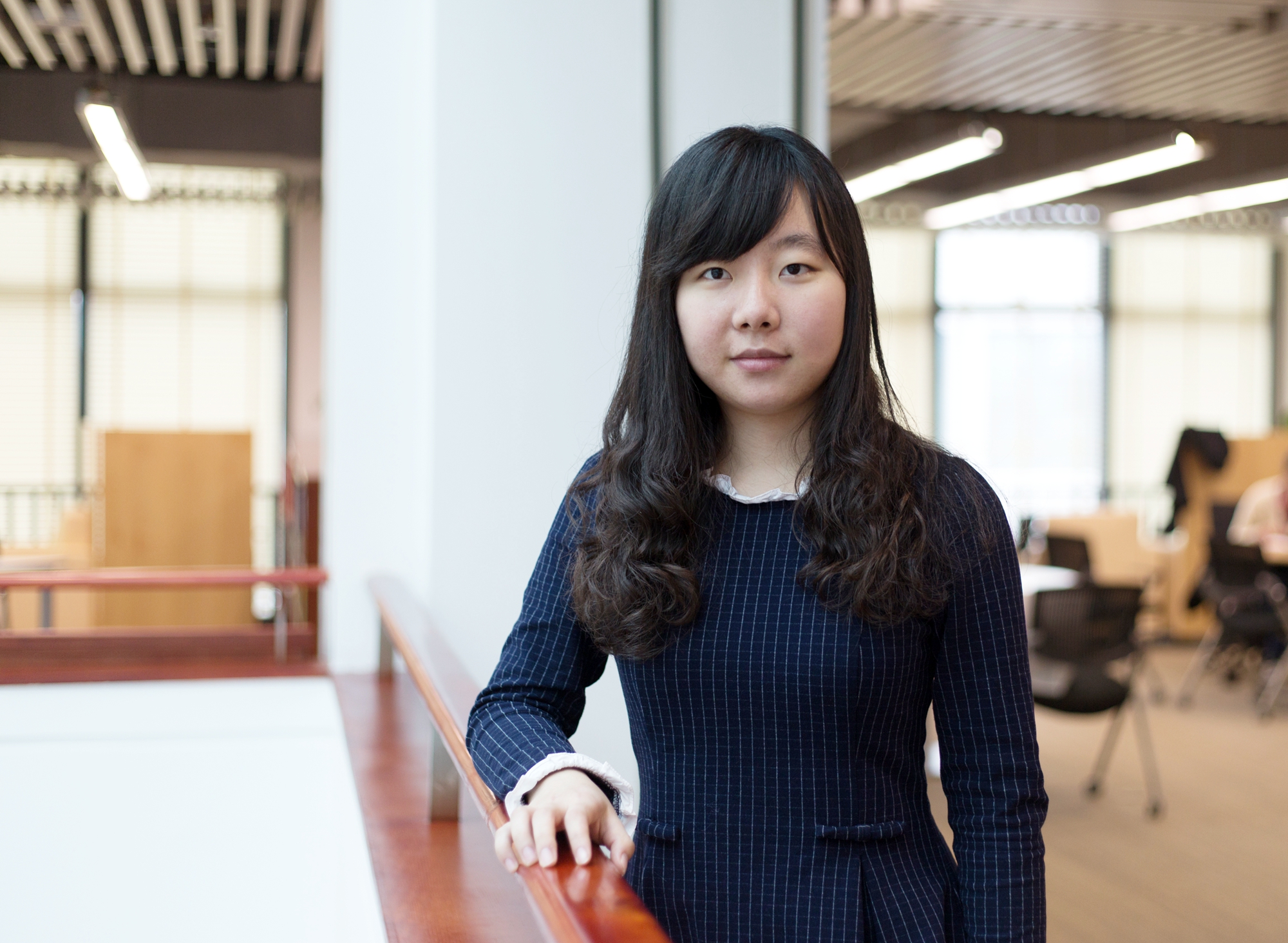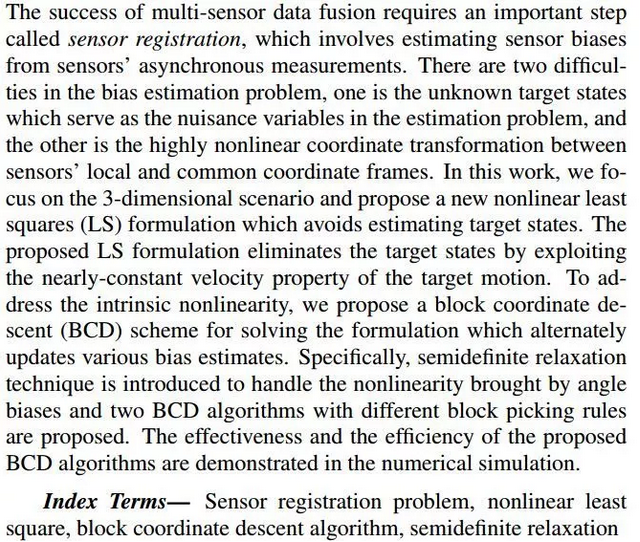Paper by SSE Student Jiang Shunan Accepted by IEEE-Global SIP
“Optimal Asynchronous Multi-Sensor Registration in 3 Dimensions”, a paper written by Jiang Shunan from CUHK-Shenzhen, was accepted by the IEEE-Global SIP conference. The first author Jiang is a senior undergraduate majoring in Computer Science and Engineering at the School of Science and Engineering, The Chinese University of Hong Kong, Shenzhen. The paper was finished under the guidance of Vice President Prof. Tom Z.Q. Luo.
The paper proposes to solve the problem of sensor registration problem with Semidefinite Relaxation and Block Coordinate Descent. IEEE-Global SIP focuses on signal and information processing with an emphasis on up-and-coming signal processing themes. The conference features world-class plenary speeches, distinguished symposium talks, tutorials, exhibits, oral and poster sessions, and panels.

About the Author
Jiang Shunan
School: SSE
College: Shaw College
Major: Computer Science and Engineering
Laboratory: Shenzhen Research Institute of Big Data
High School: Jiujiang No. 1 Middle School, Jiangxi Province
Jiang has won the National Scholarship, the First Prize of the Academic Scholarship of the University, the Dean's List Award of SSE, and the Master's List Award of the Shaw College. In 2017, she began to study and participate in research at SRIBD, and was also one of the founders of the Ribuluo Development Studio, CUHK-Shenzhen. With the support of IT Services staff, her team has developed the WeChat Campus Card and won the “Digital Star” title in the Tencent Internet + Campus Impact Rankings in September 2017.
About the Tutor
Prof. LUO, Zhiquan Tom
Professor Zhi-Quan (Tom) Luo received his BSc degree in Applied Mathematics from Peking University, China, in 1984. In the same year, he was selected by a joint AMS-SIAM committee and the Ministry of Education of China for graduate study in the United States (S.S. Chern Program). Following a 12-month intensive training in English and Mathematics, he enrolled in the Massachusetts Institute of Technology where he received a PhD degree in Operations Research in 1989. From 1989 to 2003, he was on the faculty in the Department of Electrical and Computer Engineering, McMaster University, Canada where he eventually served as the department head and was awarded a Canada Research Chair (Tier I) in Information Processing. From 2003 to 2014, Professor Luo has been a full professor at the Department of Electrical and Computer Engineering, University of Minnesota and held an endowed ADC Chair in digital technology. Currently, Professor Luo serves as the Vice President (Academic) of The Chinese University of Hong Kong, Shenzhen, and concurrently the Director of Shenzhen Research Institute of Big Data and also the Director of CUHK(SZ)-Tencent AI Lab Joint Laboratory on Machine Intelligence.
About the Paper
Received by: Conference-IEEE GlobalSIP
GlobalSIP:
The Institute of Electrical and Electronics Engineers (IEEE) is an international association for electronic technology and information science engineers. It is currently the world's largest non-profit professional technology institute.
IEEE Global Conference on Signal and Information Processing (IEEE-Global SIP) focuses on signal and information processing with an emphasis on up-and-coming signal processing themes. The conference features world-class plenary speeches, distinguished symposium talks, tutorials, exhibits, oral and poster sessions, and panels.
Paper:Optimal Asynchronous Multi-Sensor Registration in 3 Dimensions
Abstract:

Interview
Q1: This paper on multi-sensor registration in 3D covers mathematical, computer and other expertise, which has many similarities with mathematical modeling. What are the similarities and differences between the actual research and the modeling competitions that you have participated in? How do you think about these similarities and differences? Do you have any suggestions for junior students?
A1: The most significant difference is the purpose. The purpose of mathematical modeling is for fun. The purpose of the actual research is to contribute. So while it seems that both are building models to portray problems and solve problems with algorithms, the actual research is much more serious. There are many concrete manifestations: for example, research needs to be compared with many existing algorithm results, and a literature review is needed to ensure that your research really makes sense. The research cycle is long and requires enthusiasm and patience.
From my personal research experience, I feel that one should take the initiative to actively participate in research projects, actively learn the knowledge related to their own research fields, and actively consult the supervisor and other researchers in the laboratory. In fact, when you are humbly asking for advice from others, everyone will be happy to help you. Second, we must be patient. Those simple and beautiful formulas in textbooks and papers are all summed up by scholars after many failures. If you want to do research well and effortlessly, it is simply impossible. It doesn't matter if you fail, just don't give up, sum up the experience and move on.
Q2: What are the options for computer science and engineering students? How do they prepare? The information in this area of expertise is updated very quickly, so it is more focused on the ability of learners to absorb and respond to information. How do you excel in professional study?
A2: Actually, I don't think we should limit ourselves to the profession. There is no absolute connection between a person and his/her major in choosing a direction in the future. For undergraduate study, you can take more elective courses. You can listen to some other majors of interest to you. Computer majors can also take more math and statistics classes, as well as philosophy, history, psychology, economics, and more. You can go online to find open classes offered by universities at home and abroad so that you can see a lot of perspectives from the world. You will find that the roads you can choose will be very wide with many options. Even if they are not useful for a while, in my experience, you will find their role in a magical node in the future.
In fact, students of every major need to have such ability if they want to excel. I think the most important thing is to be curious. This motivation is the most important. Network resources, including speeches and open classes, should be fully utilized. Mind maps can be very useful, and I am still learning. It is recommended that you take notes, especially mind map notes, and organize the knowledge into a framework so that you can understand deeper when you study, and the efficiency will be high when reviewing.
My experience is to spend more time studying how to think of learning as a kind of happiness and a kind of enjoyment. In positive psychology, there is a concept called “flow”, referring to the immersive experience that we have when we learn. For example, the knowledge to be learned shall be challenging (it is boring if it is too simple), but not beyond your self-learning ability (or it will be suffocating). My advice is to create such an experience for yourself. I don't think "No pain, no gain" is always correct. Learning does take a lot of effort, but it doesn't mean it is painful. If you can think of learning as a happy thing, you don't even need any self-control to force yourself to learn. You will choose to study unconsciously rather than playing games because reading is much more interesting than the latter.
Copywriter: Liu Haoxiang (SSE Sophomore)
